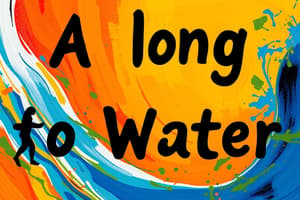Podcast
Questions and Answers
How has the setting changed in this chapter?
How has the setting changed in this chapter?
Nya and her family are back in the village.
What does the statement 'As the jeep drove up, most of the children ran to meet it' show about how the children feel about the visitors?
What does the statement 'As the jeep drove up, most of the children ran to meet it' show about how the children feel about the visitors?
The children are excited and curious about them.
How is Nya different from most of the children?
How is Nya different from most of the children?
Nya is shy, so she does not run to meet the visitors.
How does the village's chief welcome the visitors?
How does the village's chief welcome the visitors?
According to Dep, what are the chief, the village men, and the visitors talking about?
According to Dep, what are the chief, the village men, and the visitors talking about?
According to the quote, are the desert and Salva's village similar or different?
According to the quote, are the desert and Salva's village similar or different?
What does the statement 'Salva's shoes stood no chance against the hot stony desert ground' mean?
What does the statement 'Salva's shoes stood no chance against the hot stony desert ground' mean?
Why does Salva feel that the first day in the desert was the longest day he had ever lived through?
Why does Salva feel that the first day in the desert was the longest day he had ever lived through?
What was the moment that made Salva feel that this was all too much for him?
What was the moment that made Salva feel that this was all too much for him?
Why does Salva's crying put him at risk?
Why does Salva's crying put him at risk?
How does Uncle motivate Salva to keep going?
How does Uncle motivate Salva to keep going?
What theme does the quote 'If you give them your water, you will not have enough for yourself!' support?
What theme does the quote 'If you give them your water, you will not have enough for yourself!' support?
This is an example of what type of figurative language: 'It was the hardest thing Salva had ever done, taking only tiny sips when his body cried out for huge gulps of thirst-quenching, life-giving water'?
This is an example of what type of figurative language: 'It was the hardest thing Salva had ever done, taking only tiny sips when his body cried out for huge gulps of thirst-quenching, life-giving water'?
This is an example of what type of figurative language: 'A blessing of darkness fell across the desert, and it was time to rest'?
This is an example of what type of figurative language: 'A blessing of darkness fell across the desert, and it was time to rest'?
This is an example of what type of figurative language: 'The same rocks. The same acacias. The same dust'?
This is an example of what type of figurative language: 'The same rocks. The same acacias. The same dust'?
This is an example of what type of figurative language: 'At last, the sun was reluctantly forced from the sky'?
This is an example of what type of figurative language: 'At last, the sun was reluctantly forced from the sky'?
Flashcards are hidden until you start studying
Study Notes
Setting Changes
- Nya and her family return to their village setting, indicating a shift in the narrative context.
Children's Reaction to Visitors
- Children display excitement and curiosity towards the arriving visitors, reflecting their eagerness for interaction.
Nya's Characterization
- Unlike most children, Nya is shy and does not rush to greet the visitors, showcasing her reserved personality.
Chief's Hospitality
- The village chief welcomes visitors by sitting in the shade with them, engaging in conversations while enjoying tea, highlighting cultural hospitality.
Conversation Topics
- Discussion topics among the chief, village men, and visitors revolve around water, a crucial resource for the community.
Contrast Between Environments
- Salva’s observations reveal stark differences between his village, Loun-Ariik, rich in grass and shrubs, and the harsh, dry desert environment.
Salva's Footwear Struggles
- Salva's shoes suffer significantly on the hot, stony desert ground; they offer little protection, exacerbating his struggle.
Salva's Hardship
- The first day in the desert feels extraordinarily long for Salva due to relentless heat, sharp thorns, and limited access to water.
Emotional Breaking Point
- A specific moment of distress occurs when Salva stubs his toe on a rock, leading him to cry and feel overwhelmed.
Risks of Vulnerability
- Salva’s crying places him at risk as it causes him to lag behind the group, endangering his safety during the journey.
Uncle's Encouragement
- Uncle motivates Salva to persevere by reminding him of his family and village, setting small, achievable goals along their path.
Theme of Survival
- The struggle for survival is emphasized in a quote warning against giving water to others, underscoring the harsh realities faced in desperate situations.
Figurative Language - Personification
- Salva experiences the challenge of taking small sips of water personified as desperation from his body, yearning for more.
Figurative Language - Metaphor
- A "blessing of darkness" metaphorically indicates the arrival of night that brings rest, enhancing the scene's imagery.
Figurative Language - Anaphora
- The repetition in "The same rocks. The same acacias. The same dust." utilizes anaphora to emphasize the monotonous desert landscape.
Figurative Language - Personification
- "The sun was reluctantly forced from the sky" employs personification to depict the sunset, adding depth to the natural environment.
Studying That Suits You
Use AI to generate personalized quizzes and flashcards to suit your learning preferences.




